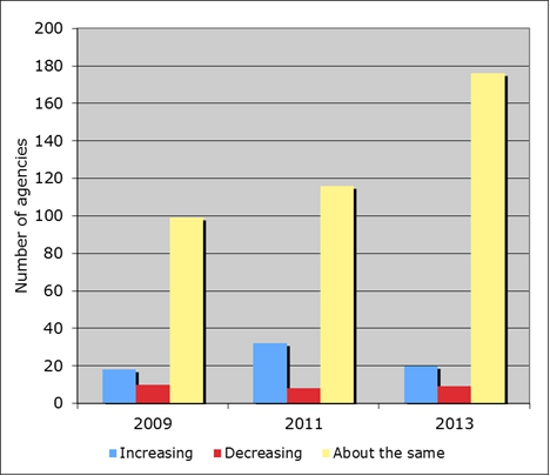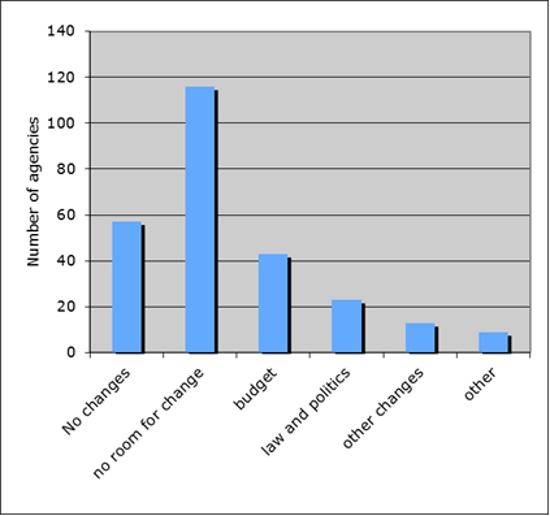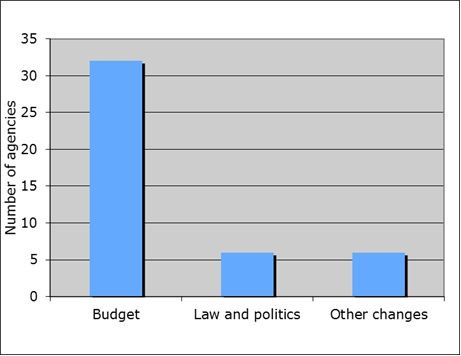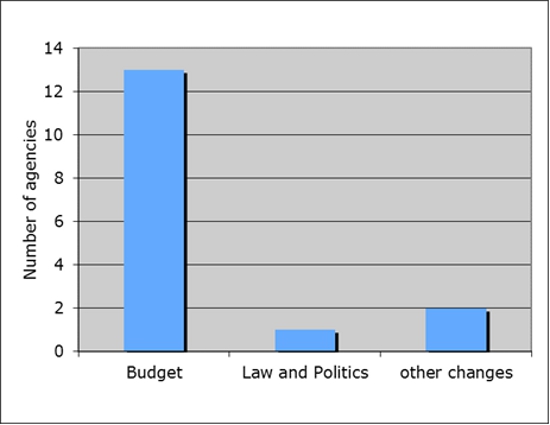
 The Great Recession of 2007 – 2009 put financial pressure on transit agencies from declining fees and state allocations. In new research, Olga V. Smirnova and Suzanne Leland look at whether or not the agencies responded to these financial pressures by contracting out services. Using national survey data from 2009, 2011 and 2013, they found that this was not the case. Transit agencies, they argue, are path-dependent in their contracting out decisions; they are influenced by both political and economic factors.
The Great Recession of 2007 – 2009 put financial pressure on transit agencies from declining fees and state allocations. In new research, Olga V. Smirnova and Suzanne Leland look at whether or not the agencies responded to these financial pressures by contracting out services. Using national survey data from 2009, 2011 and 2013, they found that this was not the case. Transit agencies, they argue, are path-dependent in their contracting out decisions; they are influenced by both political and economic factors.
The 2007-2009 recession, deemed “the Great Recession,” was the longest and deepest recession in US history since the Great Depression. Transit agencies, unlike other local government agencies depend more heavily on sales taxes, federal and state allocations, and user fees. Since these revenue sources are more vulnerable to an economic downturn than property taxes are, the expectation would be that public transit would be hit even harder by the Great Recession. One of the ways transit agencies could respond to the fiscal pressure is by contracting out their services. In new research we looked at whether transit managers changed their level of contracting out or converted to contracting out as a response to the Great Recession.
To answer this question, we collected and analyzed national survey data from 2009 (during the recession), and in 2011 and 2013 (after the recession). This unique survey is conducted biannually, and the next survey will be in the fall of 2015. Our findings indicate that contracting out decisions are path-dependent and influenced by both political and economic factors (in line with previous studies). The qualitative data also paints a nuanced picture where some transit agencies were not as affected as we hypothesized; some agencies did not have the flexibility to change their service provision arrangements; and some agencies responded in other ways, e.g. by adjusting the amount of provided services.
Contracting out has long been viewed as a cutback mechanism because introducing private sector competition should bring cost savings and improve the quality of services. However, more recent empirical studies do not find automatic cost-savings from contracting out due to factors such as high transaction costs and the lack of monitoring and competition between private providers. Transaction costs include on-going activities such as monitoring the performance of contracts. Besides the decision to switch from in-house provisions to private vendors or bring services back in-house include the conversion costs (one-time expenditures such as drafting the contracts and setting up the monitoring requirements). And our survey findings indicate that these conversion costs may be a very important factor. The influence of these costs depends on the current service type of service provision arrangements the agency maintains. That is, if an agency currently contracts out, then the considerations of conversion costs will tend to favor contracting out as a more cost-effective option.
Contracting out involvement in the next five years
Among the various questions asked in our surveys , we asked about individual transit agencies’ plans for contracting out in the upcoming five year period. As Figure 1 demonstrates, the majority of agencies (about 73 percent) did not plan on changing their service provision arrangements. This is in line with the previous literature that indicates a certain level of path-dependency in transit contracting. More agencies plan to increase contracting out services in the future rather than plan a reduction.
Figure 1 – Agency involvement in contracting out in the next 5 years (2009, 2011, and 2013 surveys).

In 2011, the survey included the question: “Which of the following statements best describes how the current recession has influenced your service provision arrangements?” Managers could select one of the three statements on whether they saw no impact on current service provision arrangements, an increase in contracting out, or a decrease in contracting out. The follow up open-ended question provided more detailed information on each response. The largest proportion of transit managers did not expect their arrangements to change. However, it is the nuanced answers within each category that make these findings interesting.
No recessionary pressure
Among managers who saw no recessionary impact on their operations, only one fifth indicated that they indeed did not experience recessionary pressures and did not plan to implement any changes. In some places, the increase in ridership may have offset any additional fiscal pressures. Another group indicated that they had no room for change due to the preexisting arrangements.
Budgetary factors played an important role as well. This is most likely dependent on the local agency’s particular situation, and if, for example, economic analysis indicated that the current service provision is efficient then it may protect agency from engaging in additional costs. Figure 2 shows the breakdown of the reasons why transit agencies stated they felt no pressure from the recession to change their contracting arrangements.
Figure 2 – The explanations for no recessionary impact on current arrangements, based on coded 2011 and 2013 responses.

Besides converting to or increasing contracting out, the transit managers could introduce other service changes, such as an overall cut in transit services. These changes are captured under “other changes” in the figure above.
Increasing contracting out
Our expectations, however, were that budgetary factors would play a more important role in increasing the prevalence of contracting out in the transit industry. The survey responses support this notion, but the managers also cited additional reasons to increase the level of services that they contract out. Figure 3 gives a list of reasons cited by agencies for increasing the level of services they contract out.
Figure 3 – Explanations for recessionary impact to increase contracting out, based on 2011 and 2013 responses.

Decreasing contracting out
The managers also cited that the contractors may be the first thing cut during a recession. Besides purely economic considerations, political factors also play an important role in contracting out decisions. Some legal provisions (e.g. state law for about 3.1 percent of respondents) may prevent transit agencies from changing their service provisions. Labor concerns and union provisions may prohibit the use of contract labor or specific types of contracts that an agency can legally sign. Figure 4 shows the individual reasons for a decrease in the level of contracting out for a particular agency.
Figure 4 – The explanations for recessionary impact to decrease contracting out, based on 2011 and 2013 responses.

Not only does our study support previous research on path dependency in contracting out but it also pinpoints various reasons for this inertia: previous obligations, legal regulations, political and stakeholder involvement, ridership, and funding.
Changing service provision involves both transaction and conversion costs, thus, agencies that already contract out are under greater fiscal pressure to keep similar arrangements. For this reason, the initial decision to provide service in-house or contract out should account for these costs. Such decisions should not be made due to short-term fiscal constraints. The most optimistic finding of our study is that, according to the three waves of transit surveys, 2009, 2011, and 2013, the decision-making time horizon is much longer than the recessionary period in the transit industry.
This article is based on the paper ‘Cutback Management during the Great Recession: The Case of Transit Agencies and Contracting Out’, in State and Local Government Review. The article will be open access until October 15th thanks to Sage publishers.
Featured image credit: Oran Viriyincy (Flickr, CC-BY-SA-2.0)
Note: This article gives the views of the author, and not the position of USAPP – American Politics and Policy, nor of the London School of Economics.
Shortened URL for this post: http://bit.ly/1EDj3I7
_________________________________
 Olga V. Smirnova – East Carolina University
Olga V. Smirnova – East Carolina University
Olga V. Smirnova is an associate professor and associate director of the MPA program, the Department of Political Science, East Carolina University. Her research interests include transportation, green transportation innovations, institutional stability, economic development, social networks, performance measurement, and visualizations of complex systems. She has published in the Public Administration Review, Journal of Public Transportation, Southeastern Geographer, and Municipal Finance Journal.
 Suzanne Leland – University of North Carolina Charlotte
Suzanne Leland – University of North Carolina Charlotte
Suzanne Leland (PhD, University of Kansas) is a professor of Political Science and Public Administration at the University of North Carolina Charlotte and the Director of the Gerald G. Fox MPA Program. Her research on urban politics and policy and alternative service delivery models appears in journals such as Public Administration Review, American Review of Public Administration, Public Budgeting and Finance and the Journal of Urban Affairs. She is the co-editor of two books on city-county consolidation.




